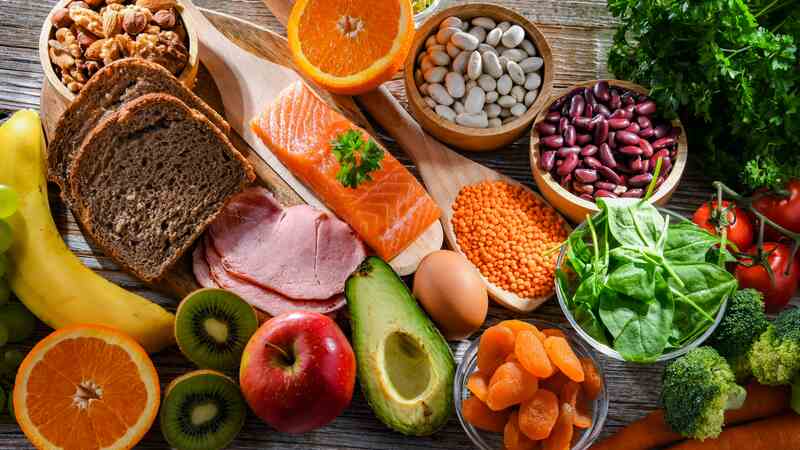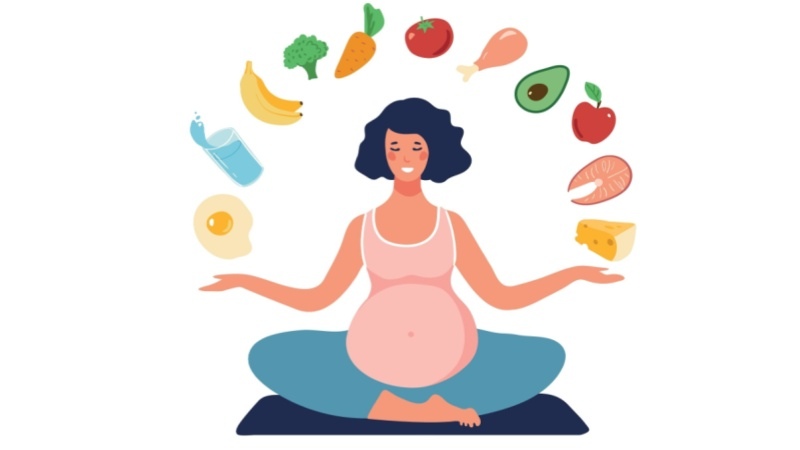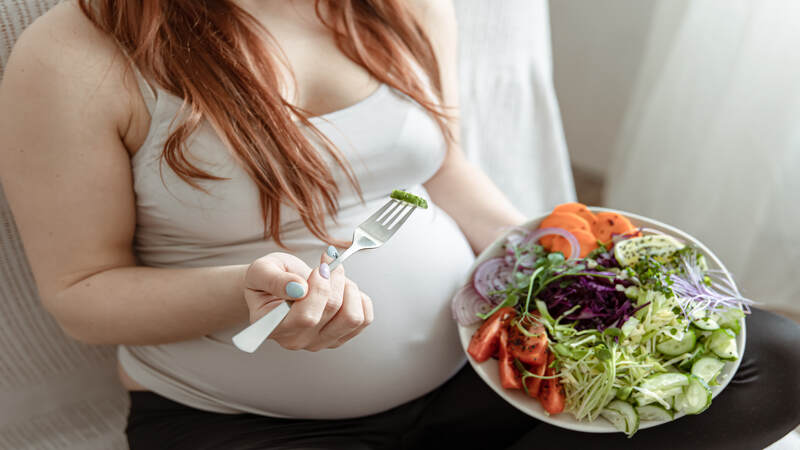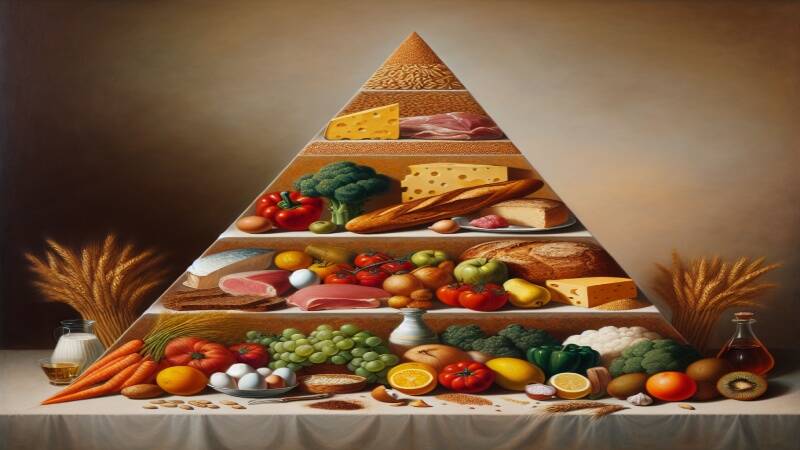
If you are pregnant, you already know that you need to make a number of lifestyle changes to ensure that you remain healthy and you give birth to a healthy child.One of the main areas where you can should focus and will make a difference is – your diet. A mother’s requirements increase during pregnancy. According to ICMR , a woman of normal weight for height should add an additional 350 kcal to her diet during the second and third trimesters. During pregnancy, a gain of 10-12 kg in weight is ideally considered healthy.
Thus it is mandatory to watch “ what you eat” and “how much you eat” during this important event of your life. (This is because your energy needs to be increased now – (you need an additional 150 kcal per day during your first trimester and up to 350 kcal during the rest of your pregnancy). However, “what you eat” is as much or more important than “how much you eat”. In this article, we try to give you a sense of both “what and how much” of healthy eating. a mother should eat for her healthy pregnancy.
How Important Is Nutrition For Pregnant Women?

Nutrition plays a vital role during pregnancy. Eating a balanced diet becomes very important for maternal and fetal health. Proper nutrition determines the health of your baby. A healthy and well-nourished mother gives birth to a healthy baby. Mothers should eat whole grains, veggies, fruits, proteins, millets, and low-fat dairy (1).
Adequate nutrients like calcium, folic acid, iron, vitamins, protein, and healthy fats should be encouraged to consume during pregnancy. Any inadequacy of nutrients during pregnancy can lead to poor development and may risk the health of the baby. A diet that contains all the nutrients ensures the proper growth and development of the baby and reduces the risk of birth defects that may occur due to deficiency of any nutrient.
Here are some important points, you need to understand about nutrition and pregnancy:
- Why Are Healthy Food Choices Important During Pregnancy?
- The Pregnancy Food Pyramid
Why Are Healthy Food Choices Important During Pregnancy?

Your baby’s source of energy comes 100% from you. Eating healthy is important for your baby’s growth and development. So it is obvious that you would want to think twice before putting anything in your mouth. However, if you do need more reasons, here they are. Healthy eating-
- Helps you stay healthy and well
- Helps in curbing morning sickness
- Helps you gain weight in a healthy way
- Helps in baby’s growth
- Helps in building the baby’s immunity
Now the next question is what to eat. If you were very health conscious and watched what you ate even before getting pregnant, then good for you. You are probably doing many things right already. However, most of us are victims of the fast-paced modern life and we need to clean up our diet quite a bit. This is where the pregnancy food pyramid comes to aid.
The Pregnancy Food Pyramid

Imagine a triangle / pyramid. Now we will place food items along this triangle, starting from the bottom to the topmost point. The items at the broader bottom would naturally indicate food that you should consume more often and the items at the top, less often. During pregnancy, the triangle should roughly look like this:
Now let us examine at each of these items for further clarity, starting with the ones a pregnant woman needs to have more often:
Water
Most probably, you are already experiencing a thirst-drive like never before and your water intake has subsequently increased by default. A mother should drink at least 8-10 glasses of water every day (3). Fruit or vegetable juices and other decaffeinated drinks can also be counted towards meeting this target.
And if you are wondering as to why is water important – the below pointers should clarify:
- It absorbs nutrients from the food you eat and transports all the essential vitamins and minerals to your blood cells. These blood cells carry these nutrients to your baby through the placenta. So water is what facilitates the transfer of nutrients to the baby.
- It can help prevent urinary tract infections.
- It can help prevent hemorrhoids / piles.
Carbohydrates (rice, cereals, pasta, bread, etc.)
We know you want to watch your weight gain. However, pregnancy is the wrong time to go on a low-carb diet. This is because carbohydrates not only provide the required energy for your body, it also gives the required fiber. Grains and millets are good sources of carbohydrates, they should contribute 45% of the total energy intake of the daily diet. Half of your calorie intake for a day should ideally come from carbohydrates.
However, you need to choose your carbohydrates wisely:
- Carbs to eat: Whole grain cereals contain more fiber than refined cereals. So pick whole grain carbohydrates like whole wheat , brown bread, brown rice, quinoa, bulgur, and buckwheat. 100% whole-wheat atta. Such food items will also help to keep your blood sugar level optimum as they are “complex carbohydrates” and hence take more time to break down and be absorbed by the body and do not spike up your blood glucose levels.
- Carbs to avoid: Keep all refined food items at bay – cakes, white rice, white bread, white pasta etc. These are simple carbohydrates and are easily and quickly converted into sugar by the body and raise your blood glucose.
Fruits
You do not need us to tell you why fruits are excellent. They are great sources of vitamins and minerals all kinds of nutrients and help in the overall development of your baby. Moreover, they keep you hydrated and take care of your sugar cravings. Try to include at least 3-4 kinds of fruits in your diet daily. Keep changing the fruit choices so that your body gets a wide variety.
Vegetables
Like fruits, we do not need to introduce to you the goodness of veggies. Apart from great nutrients, vegetables are also a great source of fiber that helps in keeping your digestive system up and running well. Try to include a variety of vegetables in different colors in on your daily diet. It is best to have a mixed vegetable salad as a mid afternoon snack daily.
Protein (dal, meat, poultry, fish, nuts)
Proteins (specifically the amino acids that are building blocks of protein) are primarily responsible for your baby’s physical growth. Increase your protein intake during your second and third trimester when both you and your baby are growing the fastest.
- If you are vegetarian, have plenty of beans, lentils, pulses, nuts and legumes (2)
- If you are non-vegetarian, include poultry, eggs and fishes (avoid ones that have high mercury content) in your diet.
Dairy (milk, dahi, cheese)
Dairy is synonymous to with calcium during your pregnancy. Calcium helps in the growth of your baby’s bones, teeth and muscles (2 a). It is also known to help in the development of the fetus’ heart and nervous system.
- Try to have 2 glasses of milk daily. Avoid adding sugar to it. Also, avoid caffeinated drinks as a dairy source.
Fats, sugars, oils: Good fats
like the ones you get in nuts, lentils and vegetables – are essential during your pregnancy. It helps in your baby’s eye development, eyesight and placenta growth. So you need to get your daily fix. However, oily food and sugar do no favors for your body or your baby’s growth. Keep away from them as much as possible.
By following this healthy food pyramid, you also get your daily fix of many essential nutrients like phosphorus and omega-3 fatty acids.
With pregnancy comes a galore of well-meaning but unnecessary advice from all and sundry. One of the most often heard about advice is that a pregnant woman needs to eat a “meal for two”. This is true – a pregnant woman needs more food intake than her not-pregnant counterpart. However, you need to remember that the “second person” here, i.e. your child, is very very small. So do not take the “meal for two” literally. Follow the pregnancy food pyramid we explained above religiously to ensure a healthy pregnancy and baby.
Happy pregnancy!
FAQ’s
1. What Food Group Should Pregnant Women Eat?
A pregnant woman should include all the food groups starting from dietary products, to fruits, vegetables, to cereals, meats and healthy fats in the right amounts in the diet during her pregnancy period to get all the nutrients in adequate amounts .
2. What Is The Diet Chart For A Pregnant Lady?
As the nutrient requirement changes during the pregnancy, a woman is advised to eat healthy and wholesome food. Women are suggested to consult the dietitian before following any diet chart .
3. What Is A Good Food Habit For Pregnancy?
Follow healthy dietary habits during the pregnancy. Add a variety of foods and vegetables to your diet. In addition, do not skip your meals, especially breakfast.Focus on eating enough amount of proteins. Consume dairy products and avoid high sugar and high fat foods. Binge on healthy snacks.
4. What Is The Best Diet For Pregnant Women?
An expectant mother needs to be extra cautious about what she eats during her pregnancy. A mother needs to take care of her as well as her baby. During pregnancy, a diet should contain all wholesome foods with higher amounts of nutrients such as healthy fat, good quality protein, fiber, adequate fluids, vitamins and minerals.
References
-
- U.S Department of Health And Human Services – https://health.gov/myhealthfinder/pregnancy/nutrition-and-physical-activity/eat-healthy-during-pregnancy-quick-tips
- NHS, Have a healthy diet in pregnancy – https://www.nhs.uk/pregnancy/keeping-well/have-a-healthy-diet/
- Montgomery KS. Nutrition Column An Update on Water Needs during Pregnancy and Beyond. J Perinat Educ. 2002 Summer;11(3):40-2 – https://www.ncbi.nlm.nih.gov/pmc/articles/PMC1595116

